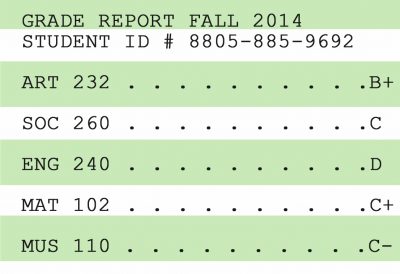 Too often, college students are stressing out about how to get good grades, instead of focusing on what they’re learning. This is a backwards method of trying to succeed, and it often sets students up for failure instead.
Too often, college students are stressing out about how to get good grades, instead of focusing on what they’re learning. This is a backwards method of trying to succeed, and it often sets students up for failure instead.
For one thing, it sets up grades as a competition for scarce resources – “If I want to get an A, I have to make sure Bob doesn’t get an A. That means I’m in competition with Bob.” For another, it sets up grades as a measure of worth – A students are somehow better than B students or C students.
Both of these things are damaging to learning.
New college students have been trained to look at grades in a way that is damaging to their ability to succeed in college. They’re told that the grade is what matters, not the knowledge, and that grades determine how worthwhile you are. So of course, they focus on how to get good grades!
My friends, if that were the case, we’d only let A students graduate from college. But you know what they call someone who graduates with a 2.5 GPA? They call that person a college graduate. Beyond college, grades rarely matter any more, unless you’re trying to get into medical, law, or graduate school. What matters is the knowledge and skills you brought out of college with you.
So if your goal is to get the degree and go get a job, why are you stressing out so much about a number? What’s more important – how to get good grades, or how to use what you learned? What is your future boss going to care about – that you got an A on a statistics test, or that you know how to run a statistical test correctly? Will it matter to them that you got 100% on a multiple-choice engineering exam, or is it more important that you understand how to design a system that will work well and not break down? What’s really important – that you piled on the vocabulary words in every college paper, or that you can write a report about your company’s HR system in clear, concise language that doesn’t leave anything out?
What you’ve been taught learning is, and the way you’ve been taught to learn, is completely wrong! It’s time to change your focus to what you’re learning instead of how to get good grades. Research shows that if you want people to do creative work beyond checking off boxes (which is the difference between high school and college, because college is about creative work), the last thing we want to do is set up a reward system beforehand. Why? Because the person will get so worked up about the reward that they can’t focus on the work. Grades are no different! You work yourself into a frenzy with your focus on your grade, and then how do you perform? Poorly. You crash, you burn, and you’re so stressed out that you fail.
Now, most professors aren’t going to change the way they grade. The institution wants grades, the professors are used to grades, and they’re going to keep doing it. But if I could, I’d get rid of the entire letter-grade system. I’d replace it with three levels: Passed With Distinction, Passed, and Did Not Pass. How would that feel? Wouldn’t it be a relief to no longer feel like you had to compete with your classmates, or to no longer have to worry about how many points you missed an A by?
So try this instead. The next time you find yourself stressing out about how to get good grades, do one (or both) of these two things:
- Talk to your professor. Ask them how you’re doing – not in terms of numbers, but in terms of knowledge. Ask them to identify one thing they think you could improve on, and then go improve it.
- Examine your last three assignments. What gets you marked down consistently? What mistakes are the big fingerprints for you? Identify one thing and work on improving it.
But don’t focus on the grade. Focus on the work, and the grade will come. And remember – grades will only matter for a little while. After that, it’s what you know, not what you scored.
Focus on increasing what you know.

